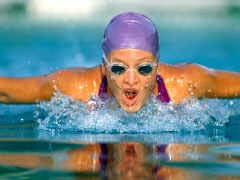|
Playing Like a
Girl
Part
4: Starving For Control

Super Stock,
Inc. |
Puberty
is a stressful time for any adolescent girl, but for athletes
- particularly in appearance-based sports such as gymnastics,
figure skating, and diving - it can damage, or even signal
the end of their ability to compete effectively in the sport.
"Puberty
was something we all feared," says Mahony, who was a competitive
figure skater up until two years ago. A 19-year-old university
student in Ottawa, Ontario, she recalls from her skating
days that decline in performance would often be blamed on
puberty. "I thought that hitting puberty would ruin my skating,
so I was determined to control the way my body looked and
grew."
| "Sports
or no sports, I am going to control my life by bingeing,
purging and starving. E.D.s [eating disorders] are my
way of controlling my life, my way of not feeling."
|
Balague,
of the University of Illinois, explains that the abrupt
changes brought on by puberty can mean an unwelcome disruption
of athletic aspirations. Some female athletes, "may see
this as something that is out of their control and try to
see it as becoming fat, not just becoming a woman."
For
many, it is this kind of desire for control - whether it
stems from the onset of puberty or something else entirely
- that is the most basic source of an athlete's eating disorder.
"Sports
or no sports, I am going to control my life by bingeing,
purging, and starving. The scale is the one thing I can
control, at least I think that I can," Meg, the runner,
explains. "E.D.s [eating disorders] are my way of controlling
my life, my way of not feeling."
Cara,
the dancer-gymnast turned coach, recalls how she used to
feel: "If I looked fat I would want to lose weight. And
'looking fat' had more to do with how I felt about things
in my life than about my actual appearance. The number didn't
matter," she says. Eating disorders, she adds, "may truly
start out as an innocent diet. Then somewhere along the
way, it evolves into a coping mechanism and ceases to be
about food."
Related
to this need for control is the fact that many female athletes
with eating disorders are perfectionists given to extreme
behavior.
"I was
very insecure, very much a perfectionist, wanted everyone
to like me, never thought I was good enough," explains Cara.
In gymnastics and ballet, "nothing is ever good enough.
Everything can be performed just a little better, the leg
can kick higher, the movement can be held a little longer,
and as a child, I was unable to see that it was not realistic
to keep moving the goal as I kept approaching it."
Adds
Mahony, "I think that my intense hatred of my body really
took the joy away from skating. It got to the point where
I blamed my poor skating on being fat. At one of my lower
points, I would get off the ice every time I fell on a jump
and make myself throw up even if I hadn't eaten anything
for hours."
Having
an eating disorder, Meg explains, "physically and mentally
makes me very tired. Sometimes I want my life back, but
then that overwhelming fear of being fat takes over and
I am back to the suffering."
|

